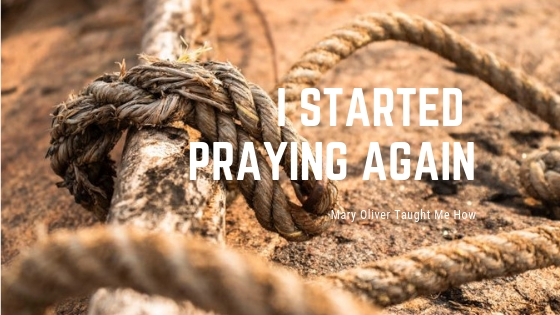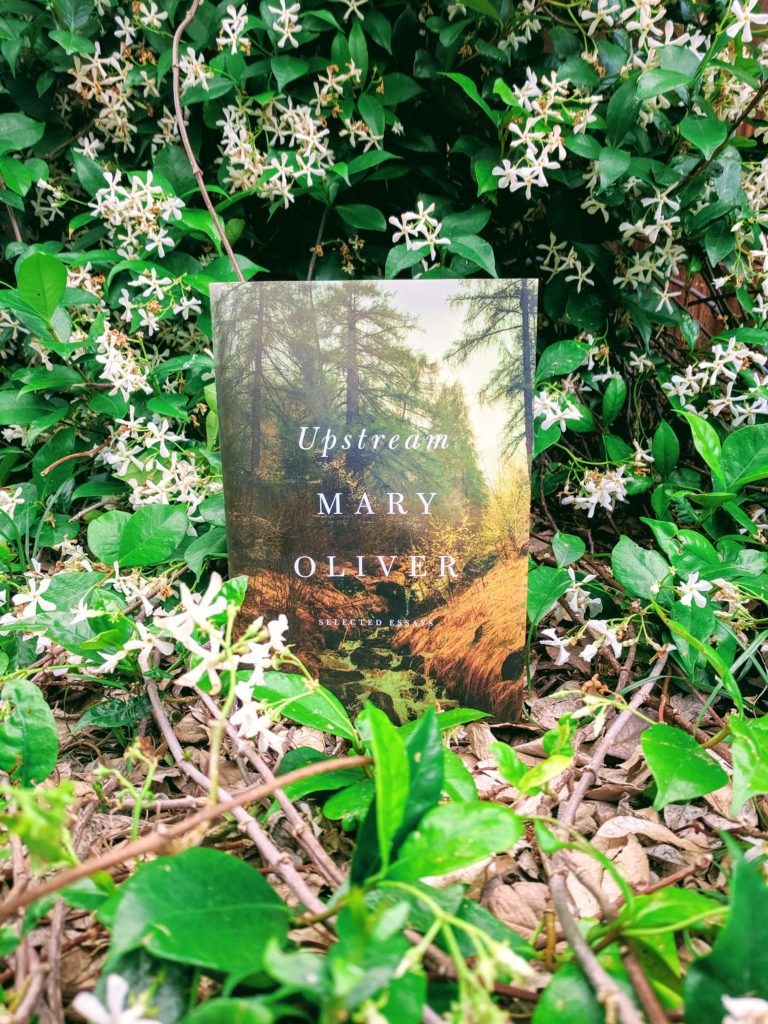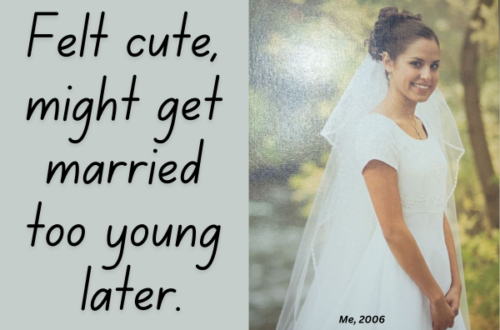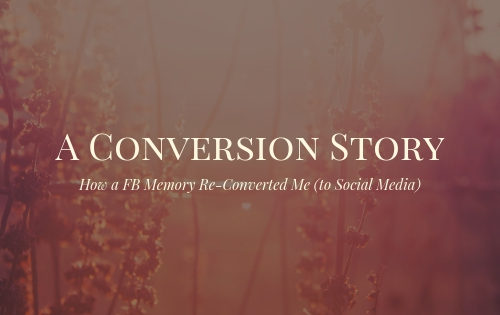
I Started Praying Again: Mary Oliver Taught Me How
There’s substance to the book jacket, a matte and waxy finish that will cling to dust. It speaks to expense, the care that was taken in housing and commodifying her words.
This is what digital can’t compete with: the tactile work of reading print, the engagement of as many senses as possible: folding corners, etching notes in the margins, hearing the glide of your pen as you absorb, interpret.
I’m glad the pages aren’t tissue, the fragile stuff of scripture, but there’s the ceremony of reverence in the opening of Upstream—every time, the buckled-down anticipation of study.

I’ve arrived in the moment—arranged in my favorite place on the backyard lawn furniture, ready to pause after every sentence, to “unpack” the meaning of each, as my critical theory professor would say. I know right away that Upstream is not a work for which a single reading will suffice; there’s something new to find every time and it all depends on what your needs are in that hour, and is that not like scripture?
“In this universe we are given two gifts: the ability to love, and the ability to ask questions.”
Mary Oliver
Love and Questions
These are selected essays. Oliver has written about the writers who inspired her, as well as the trees and rocks and animals that tutored her in the perpetual study of her existence. In her endless wanderings I can imagine her sandaled and hippied, a Christ in her own right on the prowl for communion, for the miraculous, every poem a prayer.
“In this universe we are given two gifts,” she writes. “The ability to love, and the ability to ask questions” (pg. 91).
The denial of these gifts is one of the greatest crimes we can commit against each other: people who would tell you who you’re allowed to love, the questions you’re permitted to ask. Love is love and honest, empathetic questions deserve honest, empathetic answers. When these are given and accepted they will draw us closer together and not further apart.
Oliver’s Study of Walt Whitman
In the essay, “My Friend Walt Whitman,” Oliver writes: “I never met any of my friends, of course, in a usual way—they were strangers, and lived only in their writings. But if they were only shadow-companions, still they were constant, and powerful, and amazing. That is, they said amazing things, and for me it changed the world” (pg. 9).
In my reading of Upstream, Mary Oliver became my shadow-companion, instructing me, coaching me through the study of myself, the phrasing of my questions.
“The most regretful people on earth are those who felt the call to creative work, who felt their own creative power restive and uprising, and gave to it neither power nor time” (pg. 30).
This is bracketed and starred in my copy of the book. She asserts that it’s an artist’s purpose to clarify the experiences that defy expression, the experiences for which, in the words she quotes from The Varieties of Religious Experience by William James, “no adequate report of [their] contents can be given in words” (pg. 93).
When we create, like Whitman in “Song of Myself,” we strive as near to adequacy as we can, as serious as death in our efforts to elucidate a vital Truth. But experiences, lived or by proxy, are the only successful persuader, according to both Oliver and Whitman. We attempt to recreate sometimes a life’s worth of experience in a consumable, pithy packet, and the outcome is (hopefully) empathy. And here we return to the gift of questions.
My Questions, My Prayers
Prior to my defection from Mormonism and my discovery of Mary Oliver, I was in junior high, in Spanish class, and students behind me were telling racist jokes. Elementary school at this point had already eased me into the beginnings of a gut-wrenching education on American slavery, but I was and still am learning the realities of present-day American racism, as well as the history I was never fully taught, especially not on Columbus Day or around Thanksgiving (i.e., the genocide of indigenous peoples).
It was around this time that relatives of mine were profiled and assaulted by police in Provo, Utah. These stories, these lessons, racked me. In my personal life, thanks of course to the social justice pioneers who came before me and those speaking out today, and also probably to my ethnic ambiguity and near-agoraphobia, I’ve been largely unseen by violent, make-the-news racism, or the kind of racism that loses people opportunities under no uncertain terms. My personal experiences with racism have been more subtle, and I fully recognize my privilege in that. There are certainly more potent stories out there that ought to be listened to, attended to. Questions and comments like: “What are you?” “I’ve never liked a brown girl before.” or “Do you feel American?” are innocuous next to profiling, assault, lost job and housing opportunities, poorer medical access and care, harassment, death.
That day in junior high, triggered by these jokes, I grappled with a reality that people in the world were thought of and treated a certain way because of their race.
I’m half-Mexican. The other half is a blend of European ethnicities amounting in this world to White. I hadn’t even learned at that point to acknowledge my parents as interracial. They were only Mom and Dad.
I remember the jokes setting flame to my face. That night I prayed harder than I’d ever prayed, rocking back and forth on the lower half of a bunk-bed I shared with my sister.
“Why, God? Why are people racist?”
I was praying to Mormon god. A god who had forbidden Black people until 1978 from partaking in “the Priesthood,” a divine power that would have ushered their way into the highest glory of the afterlife. I didn’t know that yet though. It wasn’t talked about in church anymore, especially not in my Young Women’s classes. I cried myself out, eventually pacified.
Not too many years later I would have a cousin (from my White side), whom I love and I doubt still harbors sentiments he was repeating from his father, tell me that I would be sinning, based on Mormon prophets’ counsel, if I married anyone that wasn’t “of my own race.” Whatever that means to a biracial person. But the point was my parents were sinners, and I would be sinning too if I married anyone who wasn’t my approximate shade.
There was a time I was led to believe that if I ever made it to the highest glory of the afterlife, the celestial kingdom, that I would be turned White—”White and delightsome” as the original Mormon phraseology goes—and it made me sad that I would lose this portion of myself—the brown that made me, me, recognizable in my own reflection.
Why, God? Why are people racist?
Empathy requires questions, and then it requires listening (or as Oliver would call it: attention), and my questions have become my prayers.
- Is God (They/Them) a racist?
- Do They think women should answer to men?
- Do They, in Their boundless capacity to love, want queer folk to fight perpetually for the right to simply be, to love who they love?
I don’t believe it of any god I’d pray to now.
- So why have all the men who have purportedly spoken for Them been racist, sexist, or bigoted in their revelations of “divine doctrine”?
I know the traditional answers already: the dogged affirmation of a light-skinned male god’s tough law and tougher love, or even his patience in revealing equality only at the pace his racist, sexist, and bigoted children will accept it. And I reject them, these answers and this spineless, permissive god—permissive at the expense of his oppressed children.
- Maybe God never spoke through men at all? Maybe God’s primary mode of communication has always been individual? Isn’t that what “personal revelation” means?
“The most regretful people on earth are those who felt the call to creative work, who felt their own creative power restive and uprising, and gave to it neither power nor time.”
Mary Oliver
Breaking Our “Ropes”
An essay that originally appeared in Dog Songs, “Ropes,” shares the story of Sammy, an incorrigible pup who defied containment, always chewing through his original owner’s ropes and ending up in Mary Oliver’s yard. His story ends happily, but there were circumstances bent on thwarting him to that end, an errant dog wandering the streets of a town that was trying to be respectable and free of strays.
Oliver muses that Sammy’s story probably had a poem or two in it somewhere: “Maybe it’s what life was like in this dear town years ago, and how a lot of us miss it. Or maybe it’s about the wonderful things that may happen if you break the ropes that are holding you” (pg. 145).
My takeaway notes: The dog catcher will eventually resign in the face of unflinching kindness and compassion toward the beautiful things in life, like the happy, fetterless wanderings of a friendly dog.
We’re meant to see ourselves in Sammy; his instinctual wolf-brained worth is significant and begs for release, for explanation, for poetry. His knots, his constraints, are ours.
Whitman insists that “man’s inner light is neither rare nor elite, but godly and common, and acknowledged,” (pg. 100). We can talk to ourselves. No prerequisites to inspiration, no rules outlining our worthiness to receive it. Our worth was always intact, our communion to the light within ourselves everlasting and inherent.
I’ve prayed in this way, communing with the already-perfect goddess in myself, and my questions have received answers that have felt like the fraying of a knot.





2 Comments
Julia Moffitt
Hi friend, I’m enjoying your blog. I’m currently struggling with this idea of a Mormon God. I have no relationship there and can’t seem to find the God I want to be there. Don’t know if that makes sense. Anyways, your writing is amazing and beautiful. Thanks for your thoughts. I have fond memories of our times together.
Reb
Hey girl, I have so many fond memories too! And your comments about mormon god make absolute sense to me. It rings so true to my experience as well. Thanks for reading and messaging 😀